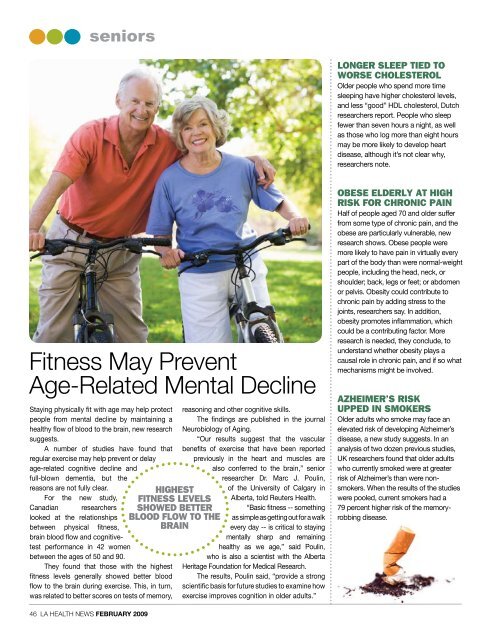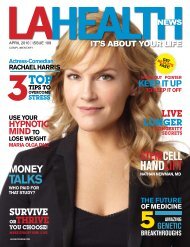JUSTIN HARTLEY SKINNY JEANS - LA Health News
JUSTIN HARTLEY SKINNY JEANS - LA Health News
JUSTIN HARTLEY SKINNY JEANS - LA Health News
You also want an ePaper? Increase the reach of your titles
YUMPU automatically turns print PDFs into web optimized ePapers that Google loves.
seniors<br />
Fitness May Prevent<br />
Age-Related Mental Decline<br />
Staying physically fit with age may help protect<br />
people from mental decline by maintaining a<br />
healthy flow of blood to the brain, new research<br />
suggests.<br />
A number of studies have found that<br />
regular exercise may help prevent or delay<br />
age-related cognitive decline and<br />
full-blown dementia, but the<br />
reasons are not fully clear.<br />
For the new study,<br />
Canadian researchers<br />
looked at the relationships<br />
between physical fitness,<br />
brain blood flow and cognitivetest<br />
performance in 42 women<br />
between the ages of 50 and 90.<br />
They found that those with the highest<br />
fitness levels generally showed better blood<br />
flow to the brain during exercise. This, in turn,<br />
was related to better scores on tests of memory,<br />
46 <strong>LA</strong> HEALTH NEWS FEBRUARY 2009<br />
HIGHEST<br />
FITNESS LEVELS<br />
SHOwED BETTER<br />
BLOOD FLOw TO THE<br />
BRAIN<br />
reasoning and other cognitive skills.<br />
The findings are published in the journal<br />
Neurobiology of Aging.<br />
“Our results suggest that the vascular<br />
benefits of exercise that have been reported<br />
previously in the heart and muscles are<br />
also conferred to the brain,” senior<br />
researcher Dr. Marc J. Poulin,<br />
of the University of Calgary in<br />
Alberta, told Reuters <strong>Health</strong>.<br />
“Basic fitness -- something<br />
as simple as getting out for a walk<br />
every day -- is critical to staying<br />
mentally sharp and remaining<br />
healthy as we age,” said Poulin,<br />
who is also a scientist with the Alberta<br />
Heritage Foundation for Medical Research.<br />
The results, Poulin said, “provide a strong<br />
scientific basis for future studies to examine how<br />
exercise improves cognition in older adults.”<br />
LONGER SLEEP TIED TO<br />
wORSE CHOLESTEROL<br />
Older people who spend more time<br />
sleeping have higher cholesterol levels,<br />
and less “good” HDL cholesterol, Dutch<br />
researchers report. People who sleep<br />
fewer than seven hours a night, as well<br />
as those who log more than eight hours<br />
may be more likely to develop heart<br />
disease, although it’s not clear why,<br />
researchers note.<br />
OBESE ELDERLY AT HIGH<br />
RISK FOR CHRONIC PAIN<br />
Half of people aged 70 and older suffer<br />
from some type of chronic pain, and the<br />
obese are particularly vulnerable, new<br />
research shows. Obese people were<br />
more likely to have pain in virtually every<br />
part of the body than were normal-weight<br />
people, including the head, neck, or<br />
shoulder; back, legs or feet; or abdomen<br />
or pelvis. Obesity could contribute to<br />
chronic pain by adding stress to the<br />
joints, researchers say. In addition,<br />
obesity promotes inflammation, which<br />
could be a contributing factor. More<br />
research is needed, they conclude, to<br />
understand whether obesity plays a<br />
causal role in chronic pain, and if so what<br />
mechanisms might be involved.<br />
AZHEIMER’S RISK<br />
UPPED IN SMOKERS<br />
Older adults who smoke may face an<br />
elevated risk of developing Alzheimer’s<br />
disease, a new study suggests. In an<br />
analysis of two dozen previous studies,<br />
UK researchers found that older adults<br />
who currently smoked were at greater<br />
risk of Alzheimer’s than were nonsmokers.<br />
When the results of the studies<br />
were pooled, current smokers had a<br />
79 percent higher risk of the memoryrobbing<br />
disease.



